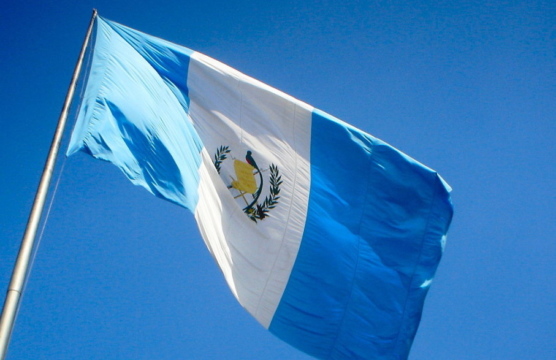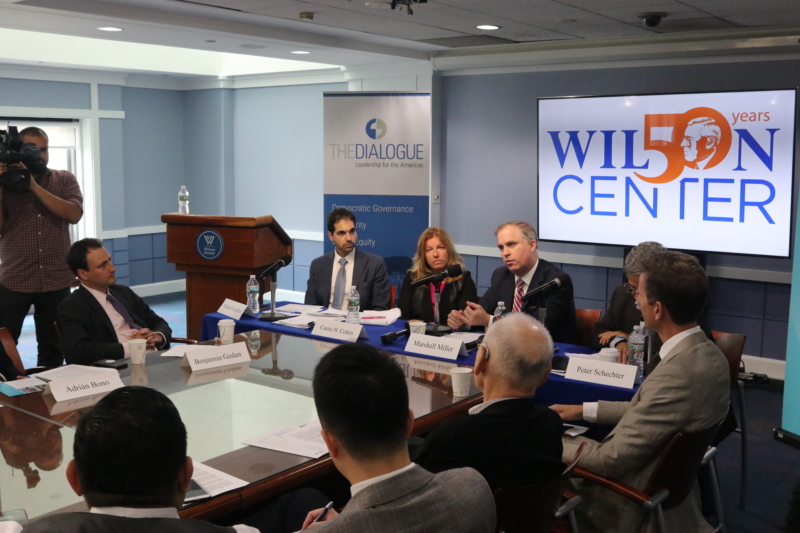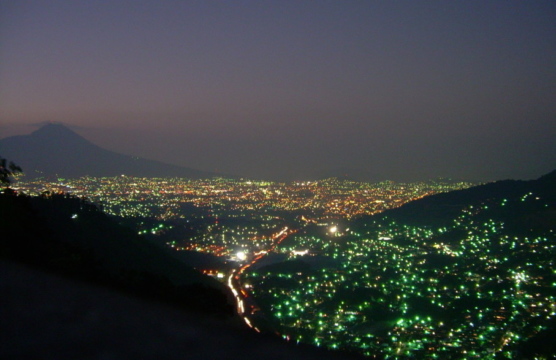
Are Countries Making Progress in Fighting Corruption?
Which countries in the region are making strides in fighting corruption, and which are falling short?
On June 21, the Inter-American Dialogue co-hosted an event with the Woodrow Wilson International Center for Scholars titled "Red Cards, Red Handed: FIFA Corruption and the Long Arm of US Law Enforcement.” Following opening remarks by Benjamin Gedan, Public Policy Fellow for the Latin American Program at the Woodrow Wilson Center, a discussion began which featured Marshall Miller, Former Chief Prosecutor in the Criminal Division of the U.S. Attorney’s Office for the Eastern District of New York; Carrie H. Cohen, former Assistant United States Attorney in the U.S. Attorney’s Office for the Southern District of New York; and Peter Schechter, Former Director of the Adrienne Arsht Latin America Center at the Atlantic Council and host of the Altamar podcast. The discussion was moderated by Michael Camilleri, Director of the Peter D. Bell Rule of Law Program at the Inter-American Dialogue. The panelists discussed the reasons why U.S. law enforcement took on corruption in FIFA , the dynamics of a complex transnational investigation such as the FIFA case, and the degree to which FIFA and its regional affiliates have undertaken reform efforts in response to the investigation and its revelations.
Camilleri opened the discussion by asking why the United States Department of Justice decided to get involved in a transnational corruption case comprised primarily of non-U.S. actors and crimes committed outside of U.S. territory. Miller and Cohen stated that the U.S. had both formal jurisdiction and a strong justification to intervene because many of the acts of bribery, fraud, and money laundering involved the U.S. banking system, and the fact that some of the acts of corruption occurred in the United States. After all, some of those indicted were officials at CONCACAF, the North American Soccer Federation, which has been headquartered in the United States for decades. In addition, in some cases the corruption related to FIFA tournaments staged in the United States.
Schechter then analyzed reform efforts undertaken by FIFA and its regional federations in response to the scandal. He argued that whereas CONMEBOL, the South American soccer federation, has done little in the way of reform after many of its former leaders were convicted of corruption-related offenses, CONCACAF has in fact improved its oversight mechanisms to prevent future incidences of corruption. However, there was no "FIFA-wide" reform.
Both Miller and Cohen underscored the fact that, unlike prosecuting criminal enterprises or terrorist organizations, FIFA was a legitimate entity with a beneficial mission whose work was undermined by corrupt actors; the enterprise was not structurally illicit even though individuals associated with FIFA were prosecuted under the Racketeer Influenced and Corruption Organizations (RICO) Act—a statute initially designed for the mafia. Cohen likened the actions of corrupt FIFA officials to those of corrupt actors in New York state government. As a former prosecutor, she said that there were usually three characteristics that led to corruption: power, greed, and - in the case of public officials - poor compensation, or the perception thereof. Miller stated that the US did not pretend to come from a place of moral superiority when prosecuting international cases: there is plenty of corruption at home, too.
Camilleri then opened the floor to questions, and one audience member inquired why the DOJ was spending its time on international corruption when there are indicators of pervasive graft in the U.S. federal government. Miller responded that both were of equal importance, and that both could be addressed: "the Department of Justice can walk and chew gum at the same time." Another asked whether the 2026 FIFA World Cup, set to be held in North America and projected to bring in significant profits to FIFA, could see a similar level of corruption. The three panelists responded with verbal shrugs: possibly. Let's hope not.
A webcast of the event is available on the Wilson Center event page.
Which countries in the region are making strides in fighting corruption, and which are falling short?
Organized criminal groups pose an increasing risk to democracy and the rule of law in El Salvador.
Over the past weeks, public discontent with the administration of President Dilma Rousseff has continued to rise.
 Leslie Ovalle / Wilson Center
Leslie Ovalle / Wilson Center
 Video
Video